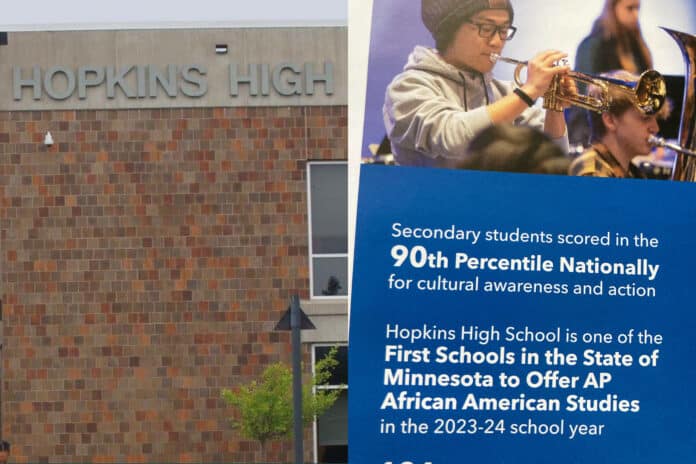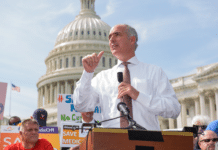
Amid declining academic test scores, Hopkins High School will be one of the first schools in Minnesota to offer the George Floyd-inspired Advanced Placement African American Studies (APAAS) course this fall.
Less than 50 percent of Hopkins High School students are proficient in reading, math or science. It will be one of just a few schools in the state to offer the class this fall along with high schools in St. Paul and Edina, the Star Tribune reported.
According to The Daily Wire, Trevor Packer, head of the College Board’s AP program, said Floyd’s death and the backlash to it had a direct impact on introducing the new course.
The course was the subject of contention last year as the College Board tried to launch it while keeping the curriculum and framework secret.
According to Stanley Kurtz, senior fellow at the Ethics and Public Policy Center, the course “defers to academia’s reigning leftist orthodoxies.”
“The radical leftist readings aren’t balanced by other points of view. Most of the sections in the final quarter of the course don’t even represent liberal viewpoints, much less conservative,” he wrote in an email to Alpha News. “The far-left authors who dominate the final part of the course generally frown on participation in mainstream party politics, whether Democratic or Republican. These people want to work outside the system in order to transform the system along socialist lines.”
After Florida Gov. Ron DeSantis pushed back against the one-sidedness of the APAAS curriculum last year, the College Board made some changes.
“They didn’t totally eliminate the radical readings, but they made many of them optional. The College Board also added an option to discuss the views of Black moderates and conservatives, but without giving clear examples of specific alternative readings,” Kurtz said.
Before the revisions, Kurtz said the final quarter of the APAAS course consisted almost entirely of pieces advocating a radical leftist — even revolutionary — position.
“Almost every author in the final quarter of the APAAS pilot was a Marxist of some sort. Few of those authors believed in America’s constitutional democracy, and most wanted to see our form of government completely replaced,” he said.
When Florida eventually opted out of APAAS, the College Board vowed to make additional changes. The College Board has not been specific, Kurtz said, but it has signaled it will “restore the radical writings.”
“It’s tough to trust the College Board to be fair at this point. They almost always go with whatever radical leftist academics tell them to do. The College Board also tends to keep its moves as secret as possible for as long as possible. That does not build trust,” he said.
APAAS is still being piloted in select schools across the country through the 2023-2024 school year.
“It has not been fully deployed and is still in development. There is another full year of pilot teaching before the course truly goes public. But we know that the first APAAS curriculum was one-sided and radical,” Kurtz said. “And now that the College Board sees no chance of getting Florida to participate, they seem to be promising to restore the biased material from the original pilot. We’ll have to see. Based on the College Board’s track record, however, this still looks like a very troubling and biased course.”
He said the final section of the course could have been structured as a debate between conservative, moderate, and radical viewpoints.
“Instead, it was pure radicalism. That means the course was indoctrination, not education,” he said.
APAAS is interdisciplinary, which means in addition to covering 400 years of history, it will also include geography, literature, arts, and politics.
Hopkins High School Principal Crystal Ballard defended her school’s decision to offer the course.
“The scholars we serve in Hopkins represent populations all over the world,” she wrote in an email to Alpha News. “We support any and all courses that help our students learn the histories of populations around the world.”
Sheila Qualls
Sheila Qualls is an award-winning journalist and former civilian editor of an Army newspaper. Prior to joining Alpha News, she was a Christian Marriage and Family columnist at Patheos.com and a personal coach. Her work has been published in The Upper Room, the MOPS blog, Grown and Flown, and The Christian Post. She speaks nationally on issues involving faith and family.
















